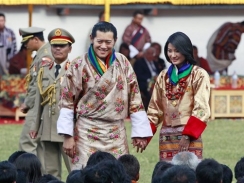News from Bhutan, Japan and the European Union
Tuesday's World Events — Posted on October 18, 2011
BHUTAN – King marries his commoner bride
PUNAKHA – The beloved king of the tiny Himalayan nation of Bhutan married his commoner bride [October 13th] in an ancient Buddhist ceremony at the country’s most sacred monastery fortress.
King Jigme Khesar Namgyal Wangchuck, wearing the raven crown, came down from his golden throne in front of a huge statue of Buddha to place a smaller, silk brocade crown upon the head of his bride, Jetsun Pema. Monks chanted in celebration as she took her seat beside him as the new queen of the country.
The wedding has captivated the nation, which had grown impatient with their 31-year-old bachelor king’s lack of urgency to find a bride and start a family of his own since his father retired and handed power to him five years ago.
Children composed poems, flight attendants practiced celebratory dances and posters of the couple were nearly ubiquitous. …..
Unlike this year’s other royal wedding — that of Britain’s William and Kate — there were no foreign princes, no visiting heads of state, no global celebrities. Just the royal family, thousands of nearby villagers gathered at a nearby field waiting for the royal couple to celebrate with them and the rest of the country’s 700,000 people watching live on TV.
“The whole theme of the wedding was to keep it a simple family affair, that is the Bhutanese family,” said Kinley Dorji, Bhutan’s secretary of information.
The Oxford-educated king is adored for pushing development and ushering in democratic reforms that established a constitutional monarchy and legislature in 2008. His teen-idol looks — slicked back hair, long sideburns — his penchant for evening bike rides through the streets and his reputation as a laid-back, accessible leader, also make him the rare monarch whose picture adorns the bedroom walls of teenage girls.
His bride, the daughter of a pilot, has been on an introductory tour of the remote villages of the nation since the king told Parliament in May, “It’s now time for me to marry.”
The remote nation began slowly opening up to the rest of the world in the 1960s. Foreigners and the international media were first admitted in 1974. Television finally arrived in 1999.
The country has not had a royal wedding since the fourth king held a mass ceremony in 1988 with his four wives — four sisters whom he had informally married years earlier. The current king says he will take only one wife, so the country is unlikely to see another such celebration for a long time. [NOTE: The practice of polygamy is legal in Bhutan…Both polygamy and polyandry (a woman having more than one husband) are very prevalent in the country,particularly in the south, where it is the most accepted. – from wikipedia]
JAPAN – Government ‘Offers 10,000 Free Trips to Foreigners’
Japan will offer 10,000 foreigners free airfares to visit the country next year, in an attempt to boost the tourism industry which has been hit by the ongoing nuclear disaster, a report said on [October 10th].
The Japan Tourism Agency plans to ask would-be travelers to submit online applications for the free flights, detailing which areas of the country they would like to visit, the Yomiuri Shimbun newspaper said.
The agency will select the successful entrants and ask them to write a report about their trip which will be published on the internet.
Tourism authorities hope that positive reports from travelers about their experiences in Japan will help ease international worries about visiting the country, the newspaper said.
The program, which will require travelers to cover other costs such as accommodation, is expected to start next April, subject to government budgetary approval.
The number of foreign tourists to Japan fell more than 50 per cent year-on-year during the three months after the March 11 earthquake and tsunami that triggered meltdowns and explosions at the Fukushima Daiichi nuclear plant. …
In June and July, tourist figures were down 36 per cent from a year ago, easing to 32 per cent in August as the country worked to reassure foreign tourism markets.
The government has said Japan is safe except for the immediate vicinity of the crippled plant, where work crews are still trying to bring the facility to a cold shutdown.
EUROPEAN UNION – Children to be Banned from Blowing up Balloons Unsupervised under New Safety Rules
Harmless looking toys that children have enjoyed for decades are now regarded by EU regulators as posing an unacceptable safety risk.
The EU [European Union] toy safety directive that has just entered into force…states that balloons must not be blown up by unsupervised children under the age of eight, in case they accidentally swallow them and choke.
Despite having been popular favorites for generations of children, party games including whistles and magnetic fishing games are to be banned because their small parts or chemicals used in making them are decreed to be too risky.
Whistle blowers, that scroll out into a long colored paper tongue when sounded – a party favorite at family Christmas meals [in England] – are now classed as unsafe for all children [through the age of 13].
The new rules are designed to protect children from the chance that a piece of the whistle could be swallowed and cause choking.
The EU directive will also force manufacturers and retailers to attach safety warnings to toys hitherto regarded as harmless.
Official guidance notes: “For latex balloons there must be a warning that children under eight years must be supervised and broken balloons should be discarded.” …..
British toy manufacturers are concerned that the new rules, which include defining coloring books and anything played with by under-14s, could drive up the price of Christmas presents because of the cost of safety tests.
But the European Commission has insisted that the new safety legislation was needed to prevent “horror stories.”
“These safety standards have been agreed by the UK [United Kingdom] together with the other EU member states in order to prevent every parent’s worst nightmare,” said a spokesman.
Another EU official admitted that the new regulations could be difficult to understand but insisted that safety experts knew best. “You might say that small children have been blowing up balloons for generations, but not anymore and they will be safer for it,” said an official.
Questions
1. For each of the 3 countries, give the following information:
a) location/the countries that share its borders
b) the religious breakdown of the population
c) the type of government
d) the chief of state (and head of government if different) [If monarch or dictator, since what date has he/she ruled? - include name of heir apparent for monarch]
e) the population
[Find the answers at the CIA World FactBook website. For each country, answers can be found under the "Geography" "People" and "Government" headings. Go to worldatlas.com for a list of continents.]
2. For Bhutan:
a) list the who, what, where and when of the news item
b) How did King Wangchuck change the government in 2008?
c) How is the King's marital status different from that of his father?
d) The country of Bhutan legalized TV in 1999. Describe your reaction to this information.
3. For Japan:
a) list the who, what, where and when of the news item
b) Why is Japan's Tourism Agency offering this program?
c) Would a free flight to Japan appeal to you? Explain your answer.
4. For the European Union:
a) list the who, what, where and when of the news item
b) Should government enact these types of laws? Explain your answer.
Background
BHUTAN: The King's wedding:
- The celebrations began at 8:20 a.m. — a time set by royal astrologers — when the king, wearing the royal yellow sash, walked into the courtyard of the 17th century monastery in the old capital of Punakha and proceeded up the high staircase inside. A few minutes later, his 21-year-old bride arrived at the end of a procession of red-robed monks and flag bearers across a wooden footbridge over the wide, blue river beside the fort and followed him inside.
- Singers chanted songs of celebration amid the clanging of drums and the drone of long dhung trumpets. She wore a traditional wraparound skirt with a gold jacket with deep red cuffs.
- Inside, the nation's top cleric, who presided over the wedding, performed a purification ceremony for the couple in front of a massive 100-foot Thongdal tapestry of Bhutan's 17th century founder, the monk-king Zhabdrung.
- The pair then proceeded to the temple for a ceremony broadcast live on national television, save for a few minutes when the king, his father and the cleric, known as the Je Khenpo, entered the sacred tomb of Zhabdrung, where only they are allowed.
- The king's father then gave the bride an array of five colored scarves representing blessings from the tomb. Hesitantly, she then approached the king's throne with a golden chalice filled with the ambrosia of eternal life. They held it together for several seconds and then he drank.
- The king, wearing his red Raven Crown, with an image of the protector bird rising from the top, came down from the throne and placed a smaller crown on her head. After she took her place as queen, the newly married couple was feted by monks playing deep tones on traditional trumpets and pounding drums.
- The Je Khenpo presented them a series of gifts — a mirror, curd, grass, a conch — representing blessings for longevity, wisdom, purity and other well wishes. (from the yahoonews article above)


